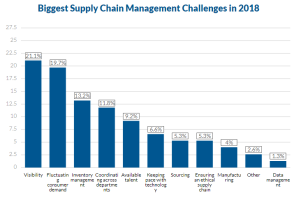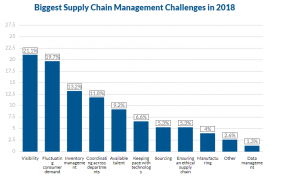IoT redefining the supply chain management

The universal existence of the internet and the proliferation of digital presence are propelling the internet-enabled things to commune among themselves without the requirement of any human meddling. These “things” may range from smart home systems to large machinery in the industry, says Rutva Safi, senior content writer, Mantra Softech India Pvt Ltd.
In a data-driven world, these connected things share and store information through an extensive network and are known as the Internet of Things (IoT). Already, the IoT market is expanding at a rate of knots. As per the statistics, during the year 2017, there were almost 8.4 billion connected things worldwide, and with the widespread uptake in technology, these things (i.e., IoT-based devices) are presumed to reach up to 20 billion by 2020. McKinsey & Co also forecasts that by the year 2025, IoT is going to have an inclusive potential economic impact from anywhere around $3.9 trillion (€3.5 trillion) to $11.1 trillion (€10.1 trillion) a year.”
When we talk about the modern supply chain & logistics industry, they demand certainty, transparency, and trust, as the existing technologies in the industry has certain limitations. Living in the age of the internet, the next-generation IoT technology wields the power of providing a mature way to enrich the effectiveness of Supply Chain Operations and bring more transparency, efficiency & accountability in supply chains.
The current scenario and challenges in supply chain management
In today’s world economy, supply chains play a vital role in every industry for sustainable growth. However, with the rapid globalisation, supply chain complexities are ever-increasing as physical supply chains expand their geographical reach in order to procure access to emerging markets. In addition to the complexities brought by globalisation, the modern supply chain faces numerous other challenges like:
- Coordinating across various disbursed, and commonly disconnected supply chain actors like producers, brokers, transporters, processors, retailers, wholesalers, and of course consumers.
- Fast last-mile delivery and lack of readiness to meet the operational needs required for direct-to-consumer fulfillment.
- Manual and tedious data reconciliation procedures.
- Lack of transparency, product traceability, and record maintenance across the entire supply chain.
- Stock management related issues such as having Back Order (product ordered but out of stock), record maintenance of stolen products and damaged or lost stock, facing a shortfall of buffer stock, not able to maintain the minimum stock level, etc.
- In-depth supply chain inventory visibility and security across all the channels in the supply chain.
- Poor time delivery estimation results and unsatisfactory customer relationship development.
- Limitation in existing Supply Chain command control centre to offer instant data access for end-to-end supply chain visibility.
- The rising cost due to unplanned logistic movement and unpredictability of freight transportation.

Image Source: Statista
As per the Zurich Insider 2018 reports, around two-thirds (rounding up to 63%) of businesses globally haven’t embraced any high-technology methods to modulate their supply chain performance. However, owing to prompt enrichments in technology and the mutable international market sentiments, the traditional supply chain is unfolding into “Supply Chain 4.0,” a more consolidated framework of the supply chain that has arisen due to ubiquitous Industry 4.0 technological sophistication like the Internet of Things.
IoT bringing revolution in the supply chain management
IoT is reforming the supply chain management operations starting from raw materials procurement to finished product inventory management. It is also redefining warehouse management and tracking & tracing the last-mile deliveries with granular information, to conduct root-cause analyses for determining bottlenecks in the system, and generate data-driven insights to optimise SCM.
- Inventory management
Inventory management is an intricate component of supply chains as it is tedious to track near-to-expiry or expirer inventory, in-transited inventory, finished/semi-finished/raw goods stock in a harmonious real-time manner. To address these kinds of teething problems, Integration of IoT devices with the existing supply chain system can help companies to streamline its inventory management part. From this, they can also able to efficiently implement the Zero Inventory and Real-Time Inventory Management strategies. IoT also assists businesses in optimising capital investment in inventory and allow them to implement Economic Ordering Quantity (EOQ) model or Build-To-Stock or Make-To-Stock (MTS) model more adequately and efficiently.

Rutva Safi
As per Wasp Barcode, in 2017, 48% of SMBs were utilising manual inventory management methods or don’t track their inventory at all. The beneficial impacts of embracing IoT technologies, 75% of large manufacturers are looking for an update in their supply chain operations utilising IoT before the end of 2019.
- Transportation management
Transportation is one of the key priorities for 83% of supply chain managers and anticipating a rise in the total logistics cost by 14% this barely comes as a surprise. Before the 21st century, companies were adopting the Just-In-Time (JIS) delivery strategy as the freight cost was lower as compared to hold the stock. Today, IoT holds the real potential of enhancing the quality of logistic services along with lowering the expenses by offering the real-time demand to hold the stock and define the frequency of re-order to minimise the warehouse space requirement and transportation cost.
The market share of transportation management systems worldwide is predicted to hit $4.8 billion (€4.3 billon) before the end of 2025. Currently, transportation & logistics activities account for 12% of the global GDP – which brings light on its criticality and enormity in SCM, especially in tracking commodities in real-time.
- Delivery management
The delivery management plays a critical role in SCM as white clove service, pre-schedule deliveries, last-mile delivery, and freight claim processing require a higher level of attention. With ever-growing consumer demand for rapid and personalised product delivery service, the delivery & logistics industry realises the need for internet-connected devices to improve real-time asset tracking, optimise routes, increase operation visibility, efficient last-mile delivery and effectively carry out Complete and On-Time Delivery (COTD) operations. IoT makes delivery operations even transparent and also assist in streamlining the Direct-To-Customer Delivery strategy since 25% of consumers worldwide, accounting to nearly 1.92 billion people, are now shopping online. As per Statista, eCommerce sales are expected to account for 13.7% of retail sales worldwide.
Companies like DHL are planning to implement IoT and Blockchain-based track-and-trace model across geographies to boost the order delivery accuracy, improve data transparency, provide end-to-end live support (for cold-chain networks), and reduce delivery errors. As per IDC and SAP’s studies, IoT will increase the delivery speed and provide greater visibility across transactions in the future, leading to 15% productivity in supply chains.
The future of IoT in the supply chain management
The SCM is witnessing a lot of change with the proliferation of more & more IoT systems and will increasingly improve the future. The benefits of IoT in the supply chains & logistics are undeniable. IoT-enabled devices are already supporting “farm-to-fork” supply chain in the United Kingdom, assisting the provider of agronomy services & technology solutions to comply with their obligations of delivering 97% of its commodity in full and on schedule to customers. Recent research reveals that almost 70% of retail & manufacturing businesses have already embarked on to redefine their supply chain processes with Industry 4.0 technologies like IoT technology, cloud, AI, etc.
The author is Rutva Safi, senior content writer, Mantra Softech India Pvt Ltd
About the author
Rutva Safi is a senior content writer working for Mantra Softech India Pvt Ltd, one of the leading Biometric and RFID providers in India. Having six years of experience, she contributes to the embedded industry through her insightful technical writings.
Comment on this article below or via Twitter @IoTGN
